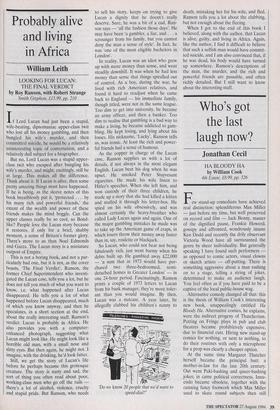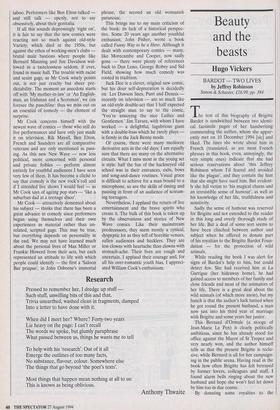Who's got the last laugh now?
Jonathan Cecil
HA BLOODY HA by William Cook 4th Estate, £8.99, pp. 326 Few stand-up comedians have achieved real distinction: splendiferous Max Miller — just before my time, but well preserved on record and film — Jack Benny, master of the dignified pause, Frankie Howerd, gossipy and affronted, wondrously insane Ken Dodd and recently the drily observant Victoria Wood have all surmounted the genre by sheer individuality. But generally speaking I have found such performers as opposed to comic actors, visual clowns or sketch artists — off-putting. There is something aggressive about a man rushing on to a stage, telling a string of jokes, determined to make an audience laugh. You feel often as if you have paid to be a captive of the local public-house wag.
Alternative comedy changed all that: this is the thesis of William Cook's interesting new book, unappealingly entitled Ha Bloody Ha. Alternative comics, he explains, were the indirect progeny of Thatcherism. Putting on Fringe plays in pub and club theatres became prohibitively expensive, due to financial cuts. Hiring new stand-up comics for nothing, or next to nothing, to do their routines with only a microphone for a prop was clearly a cheaper option.
At the same time Margaret Thatcher herself became the principal butt: a mother-in-law for the late 20th century. Out went Paki-bashing and queer-bashing jokes; in came political correctness. Innu- endo became obsolete, together with the cunning fancy footwork which Max Miller used to skate round subjects then still
taboo. Performers like Ben Elton talked and still talk — openly, not to say obsessively, about their genitalia.
If all this sounds depressingly 'right on', it is fair to say that the new comics were reacting not so much against old-style Variety, which died in the 1950s, but against the ethos of working-men's clubs brutal male bastions where people like Bernard Manning and Jim Davidson wal- lowed in a tastelessness seldom, if ever, found in music hall. The trouble with racist and sexist gags, as Mr Cook wisely points out, is not just cruelty but sheer pre- dictability. The moment an anecdote starts off with 'My mother-in-law' or 'An English- man, an Irishman and a Scotsman', we can foresee the punchline: thus we miss out on an essential of comedy — the element of surprise.
Mr Cook concerns himself with the newest wave of comics — those who still do live performances and have only just made it on television. Rik Mayall, Ben Elton, French and Saunders are all comparative veterans and are only mentioned in pass- ing. As this new New Wave — now less political, more concerned with personal and private foibles — perform almost entirely for youthful audiences I have seen very few of them. It has become a cliché to say that comedy is the new rock'n'roll and if I attended live shows I would feel — as Mr Cook says of ageing pop stars — 'like a suburban dad at a teenage disco'.
Mr Cook — attractively demented about his subject — thinks that there has been a great advance in comedy since performers began using themselves and their own experiences as material rather than un- related, scripted gags. This may be true, but everything depends on personality in the end. We may not have learned much about the personal lives of Max Miller or Frankie Howerd from their acts, but each represented an attitude to life with which people could identify — the first a 'Saloon Bar priapus', in John Osborne's immortal phrase, the second an old womanish paranoiac.
This brings me to my main criticism of the book: its lack of a historical perspec- tive. Some 20 years ago another youthful enthusiast, John Fisher, wrote a book called Funny Way to be a Hero. Although it dealt with contemporary comics — many, like Morecambe and Cooper, now sadly gone — there were plenty of references back to Dan Lena, George Robey and Sid Field, showing how much comedy was rooted in tradition.
Jack Dee is a clever, original new comic, but his dour self-deprecation is decidedly on Les Dawson lines. Punt and Dennis recently on television — are so much like an old-style double-act that I half expected the straight man to say to the comic, `You're annoying the nice Ladies and Gentlemen.' Jim Tavare, with whom I have worked — a delightful, lugubrious giant with a double-bass which he rarely plays is firmly in the Jack Benny mode.
Of course, there were many mediocre derivative acts in the old days; I am equally sure that there are many on the alternative circuits. What I miss most in the young set is style: half the fun of the hackneyed old school was in their entrances, exits, bows and song-and-dance routines. Visual grace is difficult to achieve for a man bound to a microphone, so are the skills of timing and pausing in front of an audience of scream- ing teenagers.
Nevertheless, I applaud the return of live entertainment and the brave spirits who create it. The bulk of this book is taken up by the observations and stories of New Wave comics. Like their mainstream predecessors, they seem mostly a cynical, dyspeptic lot as they tell of horrible venues, sullen audiences and hecklers. They are less clowns with heartache than clowns with stomach-ache. Their lives are rough and uncertain. I applaud their courage and, for all his over-romantic youth bias, I appreci- ated William Cook's enthusiasm.



























































 Previous page
Previous page